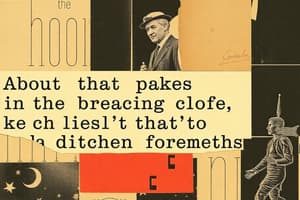Podcast
Questions and Answers
What do causative verbs indicate?
What do causative verbs indicate?
- Actions caused by the subject with help from others. (correct)
- Actions taken by the subject themselves.
- Philosophical concepts related to time.
- Descriptions of physical actions only.
All noun phrases are referring expressions.
All noun phrases are referring expressions.
False (B)
What are the four types of situation as classified by Vendler?
What are the four types of situation as classified by Vendler?
achievement, state, activity, accomplishment
Causative sentences describe a situation brought about by the subject noun phrase and are represented by an ______ clause.
Causative sentences describe a situation brought about by the subject noun phrase and are represented by an ______ clause.
Match the following terms with their meanings:
Match the following terms with their meanings:
In the sentence 'She got her ankle sprained', what type of situation is illustrated?
In the sentence 'She got her ankle sprained', what type of situation is illustrated?
Aspect refers to the emotional context of events in language.
Aspect refers to the emotional context of events in language.
Name two examples of causative verbs.
Name two examples of causative verbs.
The general term for encoding the time profiles of events in language is ______.
The general term for encoding the time profiles of events in language is ______.
Which sentence best represents a state situation?
Which sentence best represents a state situation?
Flashcards
Clause
Clause
The grammatical unit containing a verb and expressing a proposition, often conveying a complete thought.
Verb Arguments
Verb Arguments
Words or phrases required by a verb, including noun phrases, embedded clauses, and prepositional phrases.
Aspect
Aspect
The way a verb's action unfolds in time, including aspects like 'building up' or 'continuing unchanged'.
Causative Sentence
Causative Sentence
Signup and view all the flashcards
Causative Verbs
Causative Verbs
Signup and view all the flashcards
Achievement
Achievement
Signup and view all the flashcards
State
State
Signup and view all the flashcards
Activity
Activity
Signup and view all the flashcards
Accomplishment
Accomplishment
Signup and view all the flashcards
Study Notes
Noun Phrases and Reference
- Not all noun phrases refer directly to something specific.
- For example, "a famous clown" in a sentence describing Blinko, places Blinko into a category rather than referring to a specific clown.
Clauses and Propositions
- A clause typically includes a verb.
- Clauses can carry propositions, such as "Spring has come early" which indicates the start of a season.
Arguments in Sentences
- The term "argument" encompasses all necessary components a verb needs, including noun phrases.
- These components may be noun phrases like "This evidence" or embedded clauses like "that spring has come early."
Aspect in Language
- Aspect describes how language encodes the duration and progression of events.
- Examples include events building to a climax, or continuing without change.
Causative Sentences
- Causative sentences describe a situation caused by a specific subject.
- The subject's action causes a change described in the embedded clause.
Causative Verbs
- Causative verbs indicate the reason an action occurred.
- Rather than the subject performing the action themselves, they caused someone or something else to perform it.
- Examples include "make," "have," "get," "let."
Vendler's Four Types of Situations
- Zeno Vendler categorized verb phrases into four groups based on how the actions are distributed in time:
- Achievement: A situation achieved at a specific point in time
- Accomplishment: A situation taking some time culminating in a finished state.
- Activity: Continous action
- State: A situation continuing over time
Examples of Situation Types
- Achievement: Getting an ankle sprained
- State: Having a sprained ankle
- Activity: Getting physiotherapy
- Accomplishment: Getting better
Accomplishments and Activities and States
- Accomplishments contain activities and achievements which may result in states.
- For example, when someone recovers from an illness, there is an activity (healing, taking medicine), which leads to an accomplished state of being well, and a subsequent state of good health.
Achievements and Goals
- Achievements and accomplishments are focused on achieving a particular goal.
- An action is considered complete once the goal is reached: For instance, receiving jeans or a meadow flooding.
Studying That Suits You
Use AI to generate personalized quizzes and flashcards to suit your learning preferences.




